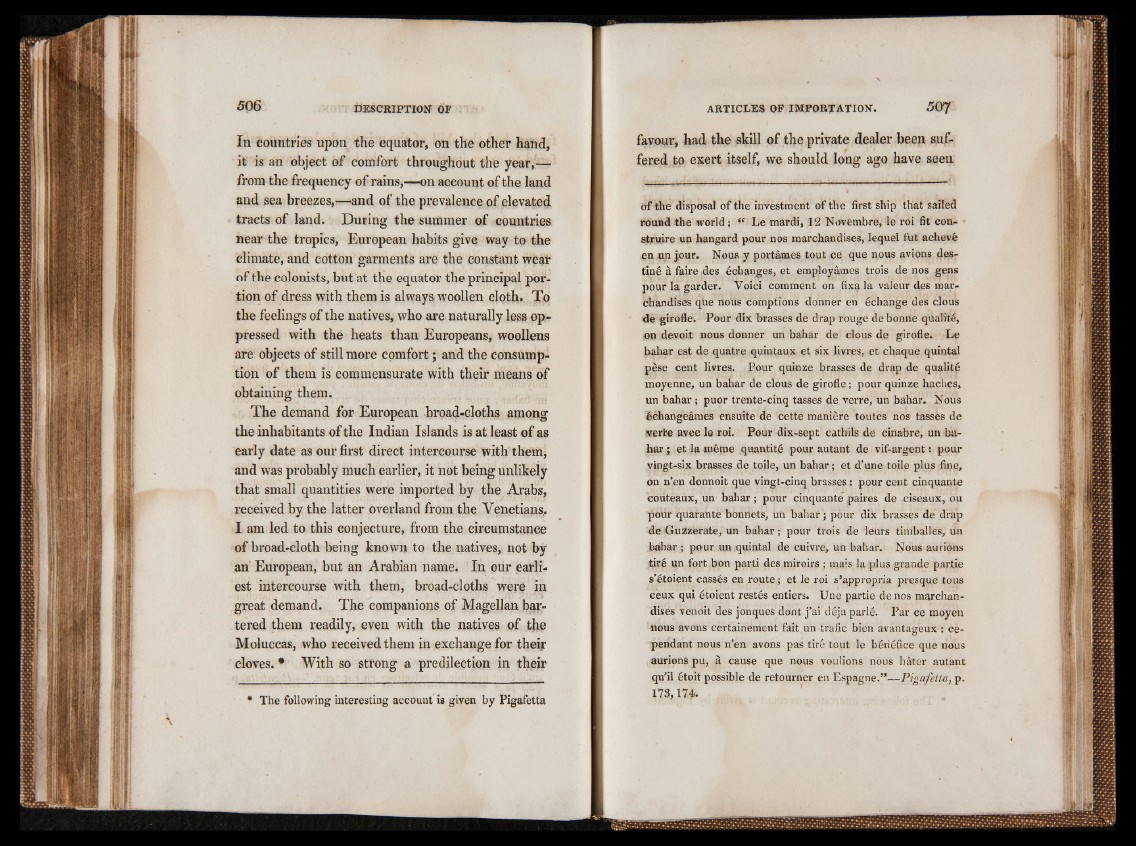
In countries upon the equator, on the other hand,
it is an object of comfort throughout the year,—
from the frequency of rains,—on account of the land
and sea breezes,—and of the prevalence of elevated
tracts of land. During the summer of countries
near the tropics, European habits give way to the
climate, and cotton garments are the constant wear
of the colonists, but at the equator the principal portion
of dress with them is always woollen cloth. To
the feelings of the natives, who are naturally less oppressed
with the heats than Europeans, woollens
are objects of still more comfort; and the consumption
of them is commensurate with their means of
obtaining them.
The demand for European broad-cloths among
the inhabitants of the Indian Islands is at least of as
early date as our first direct intercourse with them,
and was probably much earlier, it not being unlikely
that small quantities were imported by the Arabs,
received by the latter overland from the Venetians,
I am led to this conjecture, from the circumstance
of broad-cloth being known to the natives, not by
an European, but an Arabian name. In our earliest
intercourse with them, broad-cloths were in
great demand. The companions of Magellan bartered
them readily, even with the natives of the
Moluccas, who received them in exchange for their
cloves. * With so strong a predilection in their
* The following interesting account is given by Pigafetta
favour, had the skill of the private dealer been suffered
to exert itself, we should long ago have seen
of the disposai of the investment of the first ship that sailed
round the world; “ Le mardi, 12 Novembre, le roi fit construire
un hangard pour nos marchandises, lequel fut achevé
en un jour. Nous y portâmes tout ce que nous avions destiné
à faire des échanges, et employâmes trois de nos gens
pour la garder. Voici comment on fixa la valeur des marchandises
que nous comptions donner en échange des clous
de girofle. Pour dix brasses de drap rouge de bonrte qualité,
on devoit nous donner un bahar de clous de girofle. Le
bahar est de quatre quintaux et six livres, et chaque quintal
pèse cent livres. Pour quinze brasses de drap de qualité
moyenne, un bahar de clous de girofle ; pour quinze haches,
un bahar ; puor trente-cinq tasses de verre, un bahar. Nous
échangeâmes ensuite de cette manière toutes nos tasses de
verte avec le roi. Pour dix-sept cathils de cinabre, un bahar
; et la même quantité pour autant de vif-argent : pour
vingt-six brasses de toile, un bahar ; et d’une toile plus fine,
on n’en donnoit que vingt-cinq brasses : pour cent cinquante
couteaux, un bahar; pour cinquante paires de ciseaux, ou
pour quarante bonnets, un bahar ; pour dix brasses de drap
de Guzzerate, un bahar ; pour trois de leurs timballes, un
bahar; pour un quintal de cuivre, un bahar. Nous aurions
tiré un fort bon parti des miroirs ; mais la plus grande partie
s’étoient cassés en route ; et le roi s’appropria presque tous
ceux qui étoient restés entiers. Une partie de nos marchandises
venoit des jonques dont j’ai déjà parlé. Par ce moyen
nous avons certainement fait un trafic bien avantageux : cependant
nous n’en avons pas tiré tout le bénéfice que nous
aurions pu, à cause que nous voulions nous hâter autant
qu’il étoit possible de retourner en Espagne.”— Pigafetta, p.
173,174.